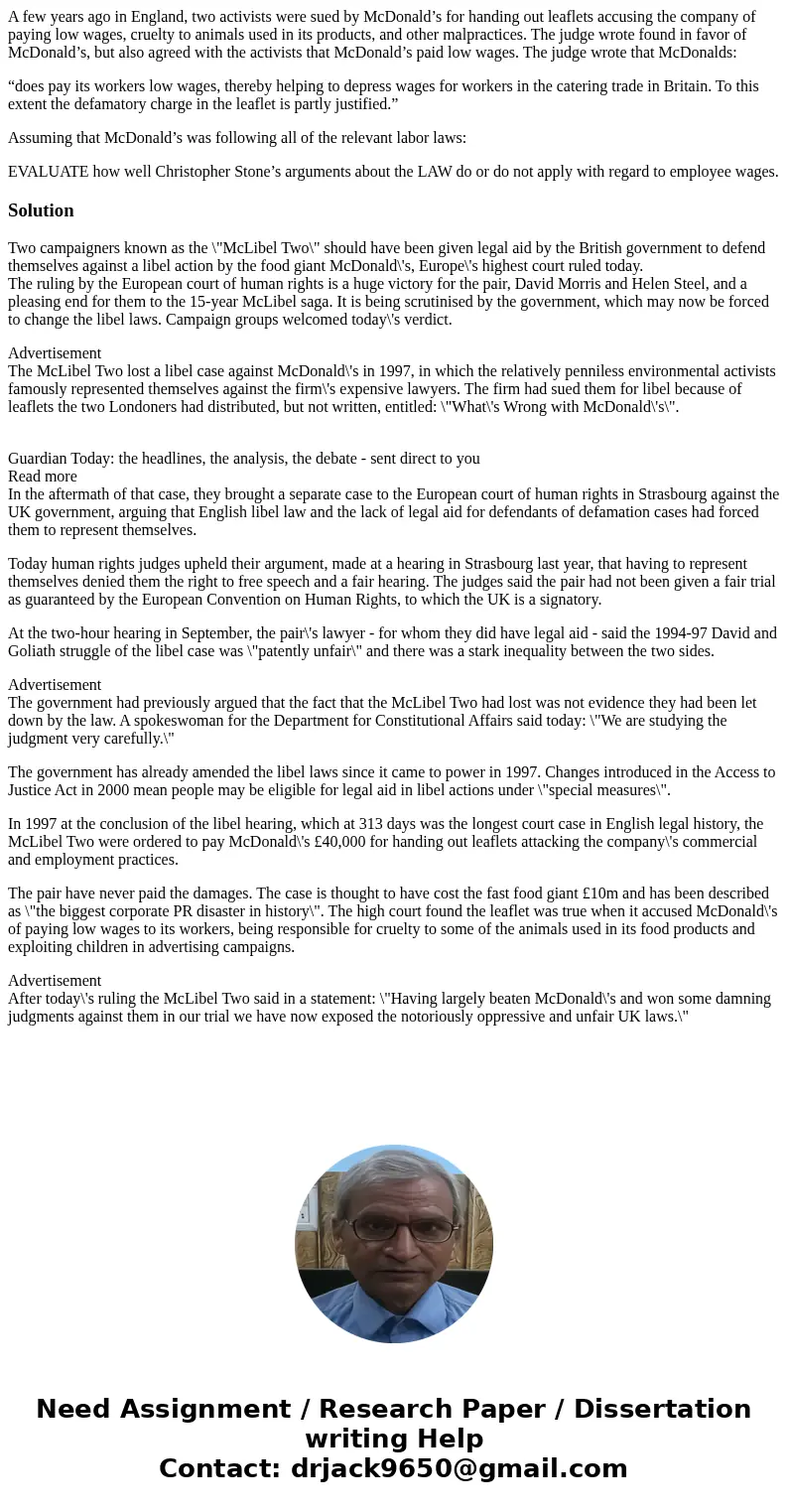A few years ago in England two activists were sued by McDona
A few years ago in England, two activists were sued by McDonald’s for handing out leaflets accusing the company of paying low wages, cruelty to animals used in its products, and other malpractices. The judge wrote found in favor of McDonald’s, but also agreed with the activists that McDonald’s paid low wages. The judge wrote that McDonalds:
“does pay its workers low wages, thereby helping to depress wages for workers in the catering trade in Britain. To this extent the defamatory charge in the leaflet is partly justified.”
Assuming that McDonald’s was following all of the relevant labor laws:
EVALUATE how well Christopher Stone’s arguments about the LAW do or do not apply with regard to employee wages.
Solution
Two campaigners known as the \"McLibel Two\" should have been given legal aid by the British government to defend themselves against a libel action by the food giant McDonald\'s, Europe\'s highest court ruled today.
The ruling by the European court of human rights is a huge victory for the pair, David Morris and Helen Steel, and a pleasing end for them to the 15-year McLibel saga. It is being scrutinised by the government, which may now be forced to change the libel laws. Campaign groups welcomed today\'s verdict.
Advertisement
The McLibel Two lost a libel case against McDonald\'s in 1997, in which the relatively penniless environmental activists famously represented themselves against the firm\'s expensive lawyers. The firm had sued them for libel because of leaflets the two Londoners had distributed, but not written, entitled: \"What\'s Wrong with McDonald\'s\".
Guardian Today: the headlines, the analysis, the debate - sent direct to you
Read more
In the aftermath of that case, they brought a separate case to the European court of human rights in Strasbourg against the UK government, arguing that English libel law and the lack of legal aid for defendants of defamation cases had forced them to represent themselves.
Today human rights judges upheld their argument, made at a hearing in Strasbourg last year, that having to represent themselves denied them the right to free speech and a fair hearing. The judges said the pair had not been given a fair trial as guaranteed by the European Convention on Human Rights, to which the UK is a signatory.
At the two-hour hearing in September, the pair\'s lawyer - for whom they did have legal aid - said the 1994-97 David and Goliath struggle of the libel case was \"patently unfair\" and there was a stark inequality between the two sides.
Advertisement
The government had previously argued that the fact that the McLibel Two had lost was not evidence they had been let down by the law. A spokeswoman for the Department for Constitutional Affairs said today: \"We are studying the judgment very carefully.\"
The government has already amended the libel laws since it came to power in 1997. Changes introduced in the Access to Justice Act in 2000 mean people may be eligible for legal aid in libel actions under \"special measures\".
In 1997 at the conclusion of the libel hearing, which at 313 days was the longest court case in English legal history, the McLibel Two were ordered to pay McDonald\'s £40,000 for handing out leaflets attacking the company\'s commercial and employment practices.
The pair have never paid the damages. The case is thought to have cost the fast food giant £10m and has been described as \"the biggest corporate PR disaster in history\". The high court found the leaflet was true when it accused McDonald\'s of paying low wages to its workers, being responsible for cruelty to some of the animals used in its food products and exploiting children in advertising campaigns.
Advertisement
After today\'s ruling the McLibel Two said in a statement: \"Having largely beaten McDonald\'s and won some damning judgments against them in our trial we have now exposed the notoriously oppressive and unfair UK laws.\"

 Homework Sourse
Homework Sourse